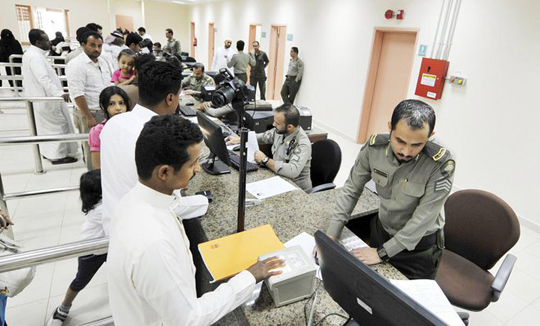Jeddah, Dec 18: The Yemeni government and expatriates living in the Kingdom have thanked Custodian of the Two Holy Mosques King Salman for taking measures to correct the status of Yemeni expatriates holding visitor IDs in the Kingdom.

The General Directorate of Passports announced an extension of the visitor identity cards of Yemeni expatriates for another six months starting Sunday in line with directives of Crown Prince Mohammed bin Naif, deputy premier and minister of interior.
The current visit visas expire on Monday.
In a statement to Saudi Press Agency, the Passport Department stressed that all arrangements have been completed for online extension of the cards.
The directorate said that there is no need for Yemenis to visit the passport offices personally to extend their ID cards. Instead, they can do it via the Absher service of the Interior Ministry’s portal (www.moi.gov.sa) after making an online payment of SR100 through their bank accounts.
The user must log in to their personal account on Absher on www.moi.gov.sa and type “visitor identity.” The card will be printed and delivered to the user through the Wasel service of Saudi Post.
In case of those who have no postal address, or have not registered their address on Wasel, a link will appear for them to register their address on Absher to receive the card, and for any further details they can connect on gdp.gov.sa@992, the directorate said.
In a statement, Yemeni Vice President Lt. Gen. Ali Mohsen Al-Ahmar appreciated the directives of the king to extend the visitor identity cards to Yemenis as a kind gesture of the Kingdom’s continued support to Yemeni people.
Al-Ahmar said he valued the order and pointed out the attention paid by the Kingdom under the leadership of King Salman to Yemenis who live in the Kingdom.
He praised the efforts of the chief of the Immigration Department and Saudi Arabia to offer the necessary facilities at the branches of the correction centers in the Kingdom, in addition to the new branches in the liberated cities and a number of embassies of Yemen abroad.
Ahmed Saleh, a Yemeni national, thanked the king for the continued support to Yemen and Yemeni nationals, and for the order of extending the visas of Yemeni visitors to the Kingdom, as the situation is not fit for them to return home.
Another Yemeni national, Ali Nidam bin Abdat, thanked and appreciated the support of Saudi Arabia and the king’s order to extend visit visas. “I was worried I would have to go back to my country, but after this announcement I am relieved that I can stay here legally. The Kingdom adopted Yemenis and provided them with a comfortable and dignified life. This royal order shows that the Kingdom cares about their Yemeni brothers.
Thanks to everyone ... the king, the royal family, and the people of the Kingdom,” he said.
Thousands of Yemeni expats are living in the Kingdom on visit visas due to the ongoing war in their homeland.






Comments
Add new comment